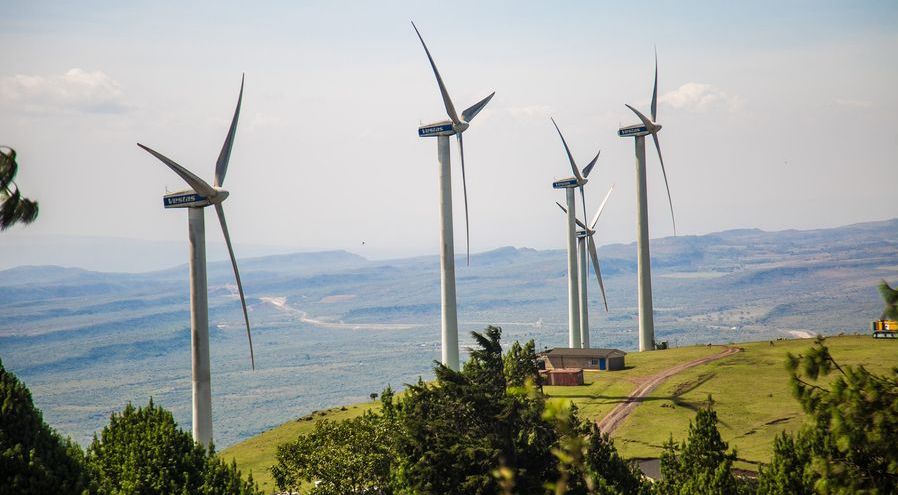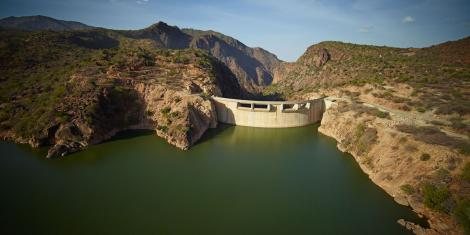
By Alex Misuko
In simple terms, wind can be defined as moving air. For centuries, mankind has leveraged on the wind to drive many things, making it, one of the most rapidly expanding renewable energy sources in the 21st century.
According to recent data from the International Renewable Energy Agency (IRENA), the installed capacity of onshore and offshore wind energy worldwide has expanded by a factor of about 75% over the previous two decades, moving from 7.5 gigawatts (GW) in 1997 to approximately 564 GW by 2018.
But with all this happening, where has wind power come from, and where are we headed to?
The first wind turbines surfaced more than a century ago following the invention of the electric generator in the 1830s. Thereafter, engineers began attempting to harness wind power to generate electricity. Although wind power was first produced in the United Kingdom and the United States in 1887 and 1888 respectively, modern wind power is thought to have originated in Denmark, where horizontal-axis wind turbines were erected in 1891, and a 22.8-meter wind turbine started operating in 1897.
Utilizing the kinetic energy provided by moving air, wind energy is used to generate electricity. Using wind turbines or other wind energy conversion technologies transform the kinetic energy into electric energy. Wind strikes a turbine's blades first, turning them and the turbine attached to them. By rotating a shaft that is attached to a generator, this converts kinetic energy into rotational energy, providing electrical energy through electromagnetism.
The turbine's size and the blades' length, will determine the quality and quantity of electricity generated. The output is inversely correlated with both the rotor's size and the wind speed cube. Theoretically, the potential for wind power doubles by eight when wind speed doubles.
The total capacity of wind turbines has developed over time. In 1985, average turbines had rotor diameters of 15 meters and rated capacities of 0.05 MW. New wind energy generators today feature offshore turbine capacity of 3-5 MW and onshore capacities of roughly 2 MW.
The average capacity of wind turbines grew from 1.6 MW in 2009 to 2 MW in 2014. With rotor diameters up to 164 meters, commercially available wind turbines now have a capacity of up to 8 MW
In Kenya, right at the northern tip of Kajiado County, about 25 kilometers from the capital city, Nairobi, is KenGen's Ngong Wind Farm, which was the first Wind Farm in Kenya and East Africa, sitting on 3,077.6 hectares of land. Its development dates back to 1993 when it had only two turbines.
In 2009, Phase I of Ngong wind farm was built. Phase 1 consisted of six turbines of 850 kW with a capacity of 5.1 MW which did very well; hence KenGen came up with Ngong Phase II, which was commissioned in 2014. Phase 11 had eight wind turbines from Vestas, a Danish model, and an additional 16 from Gamesa, which was a Spanish model generating 850Kw per turbine.
Currently, the farm has 30 wind turbines that readily convert the kinetic wind energy blowing from the windward end to the leeward side of the Great Rift Valley, generating 26 MW of clean power for the nation.
So next time you switch on the lights in your home, remember that it could be from the picturesque Ngong wind power plant.
By Evelyn Mwaura
Hydroelectric energy is one of the most used forms of renewable energy in the world. The history of hydropower dates back thousands of years. The Greeks used water wheels to grind wheat into flour more than 2,000 years ago. The evolution of the modern hydropower turbine began in the mid-1700s when a French hydraulic and military engineer, Bernard Forest de Bélidor, wrote Architecture Hydraulique.
Many key developments in hydropower generation occurred in the first half of the 19th century, and more recently, the past century has seen a number of hydroelectric advancements that have helped hydropower become an integral part of the renewable energy mix.
This technology uses the power of moving water to generate electricity. Kenya has relied on hydropower for generations to support its growing economy.
The world’s first hydroelectric project was used to power a single lamp in the Cragside Country House in England, in 1878.
In Kenya, we have been harnessing the power of water in motion to generate clean energy for over 90 years. KenGen’s Sosiani and Wanjii power stations are some of the pioneer power plants commissioned in the 1950. These paved way forthe world-famous Seven Forks Dams in later years. Today, KenGen has an installed capacity of 825.69MW from hydroelectric power drawn from about nine large power stations and five smaller ones. Hydro power accounts for 43% of KenGen’s installed capacity.

KenGen’s Turwel Dam in West Pokot County
People have a long history of using the force of water flowing in streams and rivers to produce mechanical energy. In nature, energy cannot be created or destroyed, but its form can change. In generating electricity, no new energy is created. Actually one form of energy is converted to another form.
Because the source of hydroelectric power is water, hydroelectric power plants are usually located on or near a water source. The volume of the water flow and the change in elevation—or fall, and often referred to as head—from one point to another determine the amount of available energy in moving water. In general, the greater the water flow and the higher the head, the more electricity a hydropower plant can produce.
At hydropower plants, water flows through a pipe, by the name penstock, then pushes against and turns blades in a turbine to spin a generator to produce electricity.
There are different types of hydropower facilities. Most KenGen hydropower facilities have dams and storage reservoirs, where water accumulates in reservoirs created by rivers and dams, and is released through hydro turbines as needed to generate electricity.
WHAT ARE THE BENEFITS OF HYDROPOWER?
Good for the Environment
It does not use any fossil fuels, nor does it produce any harmful emissions.
Renewable Resource
Because of the water cycle, it is a renewable resource that does not run out allowing us to conserve limited and non-renewable resources for other uses. Electricity generation does not consume water.
Production can be tailored to demand
The flow of water in dams can easily be altered to produce energy and to meet supply demands. This means that electricity can be made available when it is needed, which reduces energy waste.
It is Safe
Compared to many other forms of energy production, dams that produce hydro energy have been fairly safe over the years. Another advantage of hydroelectric energy in this situation is that there is no smoke, air pollution or combustible fuel involved, lowering the risks associated with fossil fuels or nuclear energy.
Offers alternative uses of water
Reservoirs can be used as water reserves for periods of drought, in part because the water coming out of the station is perfectly clean and usable. The water has other multiple uses including; domestic use for both human and livestock, irrigation, fishing. These uses enhance food security for communities living around the dams.
Hydroelectric Dams act as Floodgates
Hydropower provides benefits beyond electricity generation by providing flood control. There has been a big misconception that dams cause floods, but the reverse is true. In many regions around the world, dams have purposely been constructed to mitigate floods that are among destructive natural disasters that occur as a result of excess water in flood-prone regions.
So how do KenGen’s Seven Forks Dams mitigate flooding? The dams hold water and once each reaches its maximum level, the excess water naturally overflows from one dam to the next through the natural river channel.
Read more on KenGen Hydro Power Plants https://www.kengen.co.ke/index.php/energy/hydro-plants.html
Page 3 of 9





